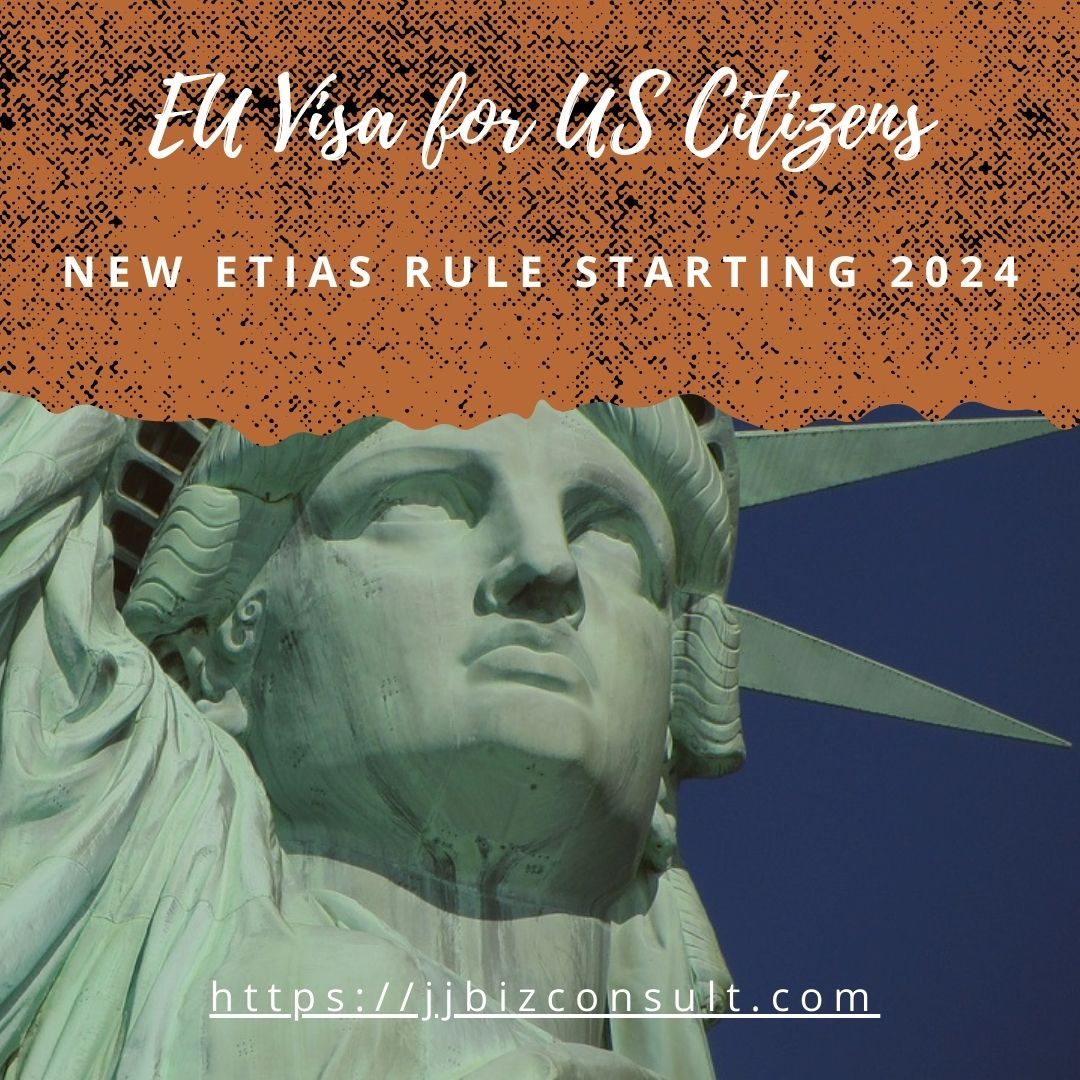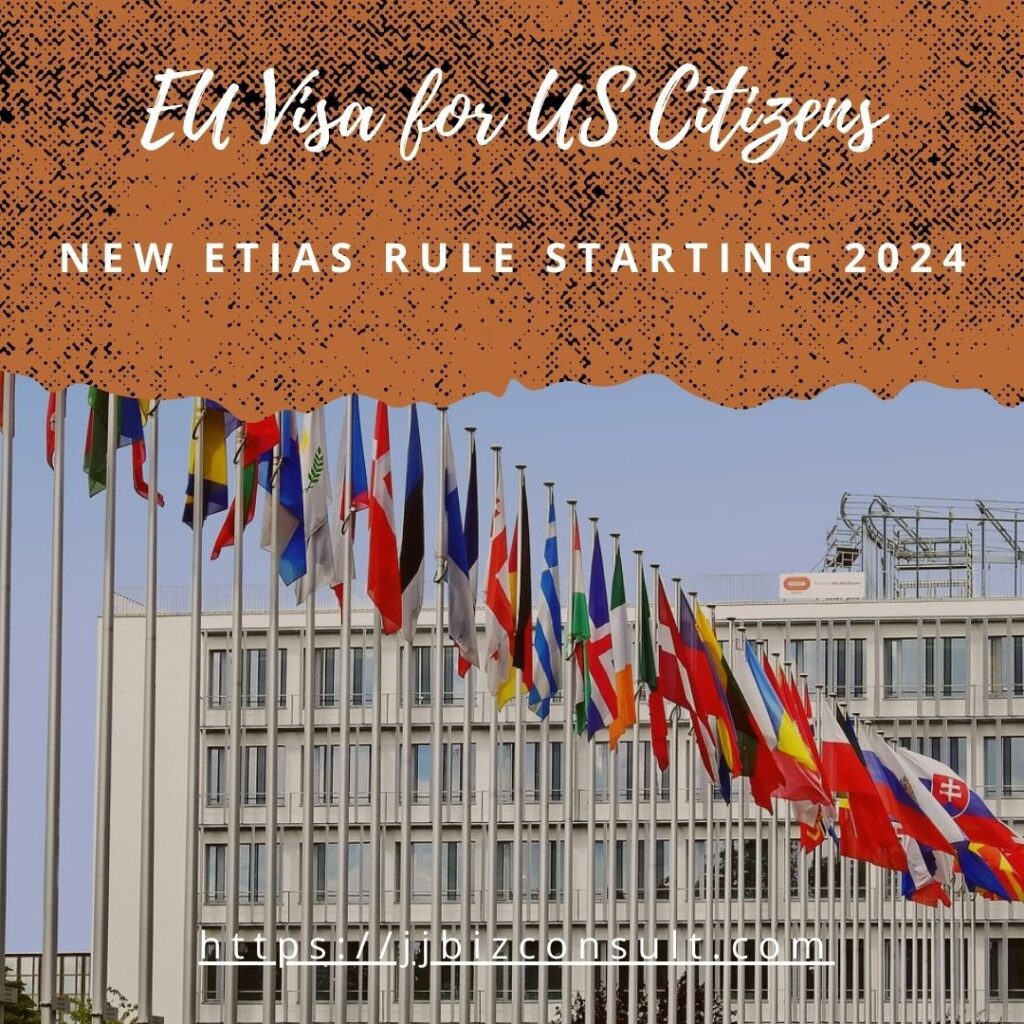
EU Visa for US Citizens. New ETIAS Rule
EU Visa for US Citizens: New Rule Starting 2024. US Travelers Will Need A Visa To Travel To Europe Starting 2024
EU Visa for US Citizens under ETIAS
EU Visa for US Citizens: The European Union (EU) has announced that it will begin requiring visas for all US travelers starting in 2024. This is a major change, as US citizens have been able to travel to Europe visa-free for many years.
The EU has said that the new requirement is necessary to improve security and border control. The European Travel Information and Authorization System (ETIAS) will allow the EU to collect information on travelers before they arrive, which will help to identify potential security threats.
The ETIAS application process is expected to be simple and straightforward. Travelers will need to provide basic information about themselves, such as their name, date of birth, passport number, and travel dates. They will also need to answer a few security questions. The application fee is expected to be around $8.
ETIAS authorizations are valid for three years or until the traveler’s passport expires, whichever comes first. This means that travelers who obtain an ETIAS in 2024 will be able to travel to the EU multiple times without having to apply for a new visa.

The ETIAS is a new system, and there are a few things that travelers should keep in mind. First, the ETIAS will not be available until 2024. Second, the ETIAS does not guarantee entry into the EU. Travelers will still need to meet the entry requirements of the country or countries they are visiting.
Overall, the ETIAS is a new security measure that is designed to improve the safety of travelers to the EU. While it is a change for US travelers who have been used to visa-free travel to Europe, the ETIAS is a relatively simple and straightforward process.
Here are some additional things to keep in mind about the ETIAS:
- The ETIAS will apply to all US citizens, regardless of their age or travel history.
- Travelers who do not have a valid passport will not be able to apply for an ETIAS.
- Travelers who have been denied a visa to the EU in the past will not be eligible for an ETIAS.
- Travelers who are applying for a visa to the EU at the same time as they are applying for an ETIAS will need to apply for two separate authorizations.
The ETIAS is a new system, and there may be some changes to the requirements in the future. Travelers should check the EU website for the latest information before they travel.
EU Visa for US Citizens: More about ETIAS

The European Travel Information and Authorization System (ETIAS) is a new security measure that will be required for visa-exempt travelers to enter the Schengen Area starting in 2024. The ETIAS will allow the EU to collect information on travelers before they arrive, which will help to identify potential security threats.
The ETIAS application process is expected to be simple and straightforward. Travelers will need to provide basic information about themselves, such as their name, date of birth, passport number, and travel dates. They will also need to answer a few security questions. The application fee is expected to be around $8.
ETIAS authorizations are valid for three years or until the traveler’s passport expires, whichever comes first. This means that travelers who obtain an ETIAS in 2024 will be able to travel to the Schengen Area multiple times without having to apply for a new visa.
Here are some additional things to keep in mind about the ETIAS:
- The ETIAS will apply to citizens of 62 countries, including the United States, Canada, Australia, and New Zealand.
- Travelers who do not have a valid passport will not be able to apply for an ETIAS.
- Travelers who have been denied a visa to the EU in the past will not be eligible for an ETIAS.
- Travelers who are applying for a visa to the EU at the same time as they are applying for an ETIAS will need to apply for two separate authorizations.
The ETIAS is a new system, and there may be some changes to the requirements in the future. Travelers should check the EU website for the latest information before they travel.

Here are some of the benefits of the ETIAS:
- The ETIAS will help to improve security at the borders of the Schengen Area.
- The ETIAS will make it easier for visa-exempt travelers to enter the Schengen Area.
- The ETIAS will create a more seamless travel experience for visa-exempt travelers.
Here are some of the challenges of the ETIAS:
- The ETIAS could be seen as an unnecessary additional layer of bureaucracy for visa-exempt travelers.
- The ETIAS could be used to collect too much personal information about travelers.
- The ETIAS could be vulnerable to fraud or misuse.
Overall, the ETIAS is a new security measure that is designed to improve the safety of travelers to the EU. While it is a change for visa-exempt travelers who have been used to visa-free travel to Europe, the ETIAS is a relatively simple and straightforward process.
Countries exempted from ETIAS
The following countries are exempt from the ETIAS requirement:
- Albania
- Andorra
- Armenia
- Austria
- Azerbaijan
- Belgium
- Bosnia and Herzegovina
- Bulgaria
- Croatia
- Cyprus
- Czech Republic
- Denmark
- Estonia
- Finland
- France
- Georgia
- Germany
- Greece
- Hungary
- Iceland
- Ireland
- Italy
- Kosovo
- Latvia
- Liechtenstein
- Lithuania
- Luxembourg
- Malta
- Monaco
- Montenegro
- Netherlands
- North Macedonia
- Norway
- Poland
- Portugal
- Romania
- San Marino
- Serbia
- Slovakia
- Slovenia
- Spain
- Sweden
- Switzerland
- Turkey
- Ukraine
- United Kingdom
These countries are either members of the European Union or the Schengen Area, or they have existing visa-free arrangements with the EU. Travelers from these countries will not need to apply for an ETIAS to enter the Schengen Area.
What will I be asked on the ETIAS application form?
As a pre-screening check, the ETIAS online application form will ask for basic personal details to establish your identity.
This will include:
- Valid passport / Travel document information
- Full name
- Current address
- Citizenship status
- Sex
- Preferred gender
- Dual citizenship status
- Email address
- Telephone number
- Date of birth
- Final destination member state
- Educational background
- Occupational background
During the ETIAS application or appeal process, you may be asked about your:
- Criminal history
- Past incarceration
- Felon status
- Past European travel
- Drug use
- Health history
How much does it cost to submit an ETIAS application form?
The ETIAS application process requires an application fee of 7 (EUR) euros. Payment is required to complete the application process. ETIAS will only accept electronic payments from your debit or credit card.
Once payment is completed, most applicants will receive an approval within minutes. An approved ETIAS visa waiver will be valid for three consecutive years upon issuance.
Travel documents
To apply, you will need a valid travel document to which a visa may be affixed.
Your travel document should not expire in less than three months and it should not be older than 10 years. If your document expires sooner, check here to know how it affects your travel.
A travel document which does not comply with international standards may be rejected during the application process. It may also pose problems when a carrier verifies your travel authorisation prior to boarding. If you have any doubt about whether your travel document entitles you to cross the borders of the European countries requiring ETIAS (and to apply for an ETIAS travel authorisation), please check the European Council’s website and the lists the European Commission has published hereEN••• and hereEN•••.
It is important to note that this list may change in the future. Travelers should check the EU website for the latest information before they travel.
World’s Most Important Citizenship by Investment Programs






